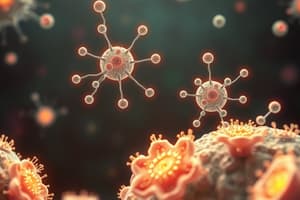Podcast
Questions and Answers
What role does phosphorylation play in signal transduction pathways?
What role does phosphorylation play in signal transduction pathways?
- It removes phosphate groups from proteins.
- It inhibits the signaling process.
- It is a type of cellular response.
- It adds a phosphate group to a protein. (correct)
What is a key function of second messengers in cell signaling?
What is a key function of second messengers in cell signaling?
- To directly alter gene expression.
- To amplify the initial signal within the cell. (correct)
- To deactivate receptors immediately.
- To perform dephosphorylation.
Which of the following is NOT a cellular response resulting from signal transduction pathways?
Which of the following is NOT a cellular response resulting from signal transduction pathways?
- Altered gene expression.
- Increased cell metabolism.
- Enhanced signal reception. (correct)
- Cell division or death.
Which cellular response involves the modification of energy production processes?
Which cellular response involves the modification of energy production processes?
What is the final outcome of cell communication in the context of multicellular organisms?
What is the final outcome of cell communication in the context of multicellular organisms?
What are signaling molecules primarily responsible for in cell communication?
What are signaling molecules primarily responsible for in cell communication?
Which type of cell communication involves a cell releasing signaling molecules that act on itself?
Which type of cell communication involves a cell releasing signaling molecules that act on itself?
Which type of signaling is characterized by signaling molecules released into the bloodstream?
Which type of signaling is characterized by signaling molecules released into the bloodstream?
What role do receptors play in the process of signal transduction?
What role do receptors play in the process of signal transduction?
Which type of signaling involves direct communication between two cells?
Which type of signaling involves direct communication between two cells?
Which of the following is NOT a characteristic of paracrine signaling?
Which of the following is NOT a characteristic of paracrine signaling?
What is the primary function of signal transduction pathways in cell communication?
What is the primary function of signal transduction pathways in cell communication?
Which example illustrates synaptic signaling?
Which example illustrates synaptic signaling?
Flashcards are hidden until you start studying
Study Notes
Overview of Cell Communication
- Cell communication allows interactions among cells and with their environment, vital for coordination in multicellular organisms.
- Essential processes include development and maintenance of homeostasis.
Key Components of Cell Communication
- Signaling Molecules: Serve as messengers that relay information; include proteins, hormones, and gases.
- Receptors: Membrane or intracellular proteins that bind to specific signaling molecules to initiate a response.
- Signal Transduction Pathways: Series of molecular events prompted by signaling molecule-receptor binding, amplifying signals for cellular responses.
Types of Cell Communication
-
Paracrine Signaling:
- Operates over short distances; cells release signaling molecules affecting nearby cells.
- Example: Neurotransmitters facilitating communication in the nervous system.
-
Endocrine Signaling:
- Functions over long distances; hormones released into the bloodstream target distant cells.
- Example: Insulin regulating blood glucose levels.
-
Autocrine Signaling:
- Short-range communication where a cell releases signals that act on itself.
- Example: Growth factors stimulating cell division.
-
Synaptic Signaling:
- Occurs at very short distances across synaptic clefts; specialized for neuron communication.
- Example: Transmission of nerve impulses between neurons.
-
Contact-Dependent Signaling:
- Involves direct contact between cells; signaling molecules presented on one cell interact with receptors on another.
- Example: Interactions among immune cells.
Signal Transduction Pathways
- Include cascades that amplify initial signals resulting in cellular responses.
- Phosphorylation: Addition of phosphate groups to proteins, often mediated by kinases.
- Dephosphorylation: Removal of phosphate groups, typically done by phosphatases.
- Second Messengers: Intracellular small molecules (like cAMP, Ca2+, IP3) generated following receptor activation.
Cellular Responses
- Results of cell communication may include:
- Altered Gene Expression: Activation or suppression of specific genes.
- Changes in Cell Metabolism: Adjustments to energy production or waste management.
- Cell Movement: Migration or relocation of cells in response to signals.
- Cell Division or Death: Processes like proliferation or apoptosis are triggered.
Summary of Importance
- Cell communication is fundamental for the intricate functioning of multicellular organisms, involving complex exchanges and interactions that lead to diverse cellular outcomes.
Studying That Suits You
Use AI to generate personalized quizzes and flashcards to suit your learning preferences.




